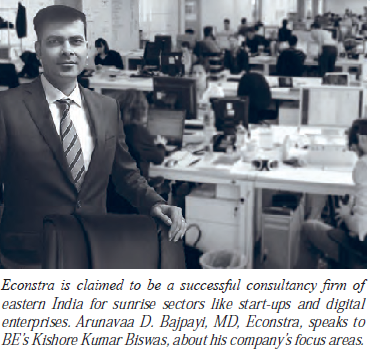 Q. For vibrant start-ups, is there a major role for consultants as the entrepreneurs seem pretty clear on what they want?
Q. For vibrant start-ups, is there a major role for consultants as the entrepreneurs seem pretty clear on what they want?
A. The dependence on consultancy is now not a luxury, it is a necessity. The production system is now becoming more and more multi-disciplinary. This calls for the need of consultants. The studies suggest that successful entrepreneurs are very dependent on consultants. Generally, the knowledge has to be passed on to a company mainly through consultants. One can examine the growth history of the present Fortune 500 companies. The established big companies solve the problems by spending money. But the start-ups solve this on their own and this helps them to grow.
Q. Which sector do you consider to be the most promising now and how do you choose clients?
A. The technology-intensive start-ups are the most promising.
At first, we study the projects of our clients thoroughly. If the projects seem to be promising and if we see that the clients are willing to accept our suggestions, only then we go for consultancy.
Q. How do you fund your clients?
A. As we are not brokers, we at first assess the viability of the projects. Then we study the real need and amount of funding. We do fund the projects according to the need. We have, as of now, $75 million for this purpose. Other investors are inclined to invest for profits and their project assessments are not always very good. This is why our clients’ success rate is more than 75%. Whereas it is less than 20% in the case of ordinary investors.
Q. It is known that the eastern region of India is not at the forefront in the industrial sector. Why have you then chosen this area as your targeted region?
A. It is not true that this region cannot develop industrially. It is a region of industrial brain and talent. Hundreds of people of this region are moving towards the southern parts of the country such as to Bengaluru and many of them are doing well
there. You can have a considerable level of achievement staying here as opportunities are present at the local level. I think this region is a promising one for the start-ups. Here we can have a role to play to help achieving aspirations of the entrepreneurs.
Q. Which types of companies can be the most suitable clients in this region?
A. As a boutique or small consultant, we target projects valued within the range of, say, ` 100 to ` 500 crore.
Q. How successful have you been in expanding in this region?
A. As of now we are consulting16 entrepreneurs. The clients are from West Bengal, Odisha, and Assam. We believe that more and more entrepreneurs will come in contact with us. New entrepreneurship will emerge from this region in the medium term. I remember a case in Assam where a company under our consultancy had been sellingAssamese tea from the state to other parts of the world. An Assam tea trader, working anywhere, does not need to look into the quality of the products and purchasing those at competitive rates. Everything will be guaranteed by the Assamese company. The company is doing well and growing rapidly.
Q. What’s your special traits?
A. We have the experience to work with world famous companies in this trade. We are at an advantage. We can deal with difficult situations. Additionally the price of our service is comparatively low, we charge only 15 to 20% of a project-cost for the service.
Most important of all, we take the responsibility of all round consultancy. Most of the other firms are specialized in one or two areas, brand or financial consultancy only, for example.
But we are concerned with consultancy in six areas like market, finance, operation, organizational structure, market research, and even in future growth strategy. This all pervasive consultancy helps a firm to grow in a much better way as each of the area is inter-related.
Add new comment